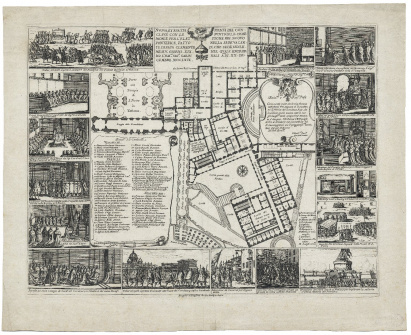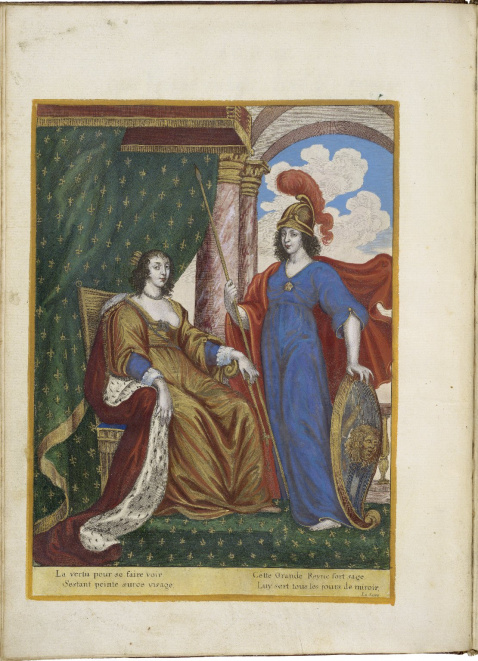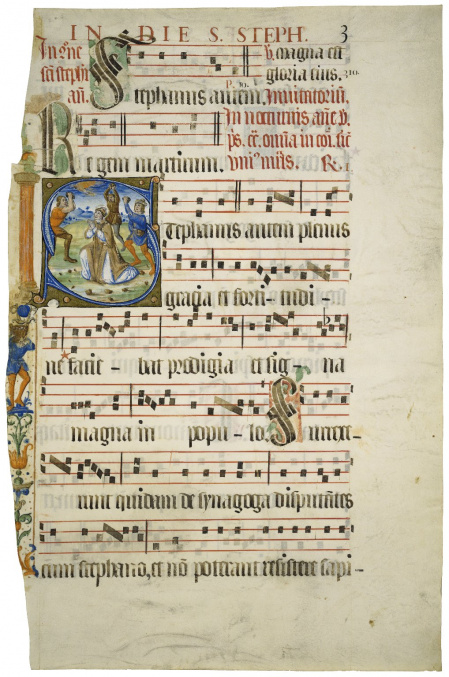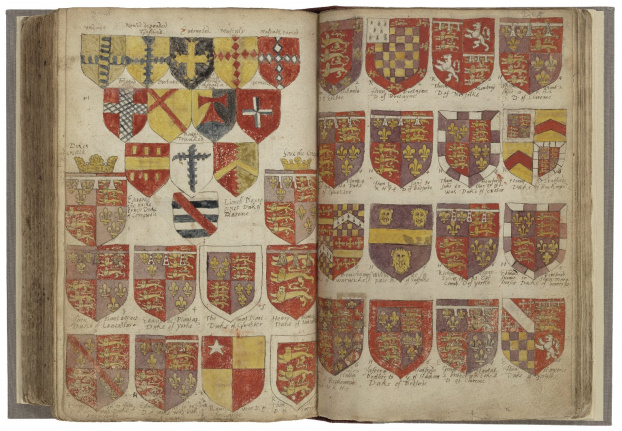Sites of Cultural Stress from Reformation to Revolution (NEH Institute): Difference between revisions
No edit summary |
No edit summary |
||
| Line 1: | Line 1: | ||
Directed by '''[[Claire Sponsler]]''', Professor of English at the University of Iowa | |||
June 21 through July 23, 2010 | |||
This [[NEH_Summer_Institute_for_college_and_university_faculty|NEH Summer Institute for College and University Faculty]] offered a comparative study of ritual and ceremony across related European cultures from 1300 to 1700. It built on anthropological theories of the ubiquitous role of ritual and ceremony and the impact of that work in performance studies. Testing assumptions about influence and exchange among national traditions and local contexts, it sought a new understanding of the processes and effects of cultural hybridity and assimilation. | |||
[[File:ART Box R763 no.23.jpg|thumb|411x411px|right|[http://luna.folger.edu/luna/servlet/s/i7cx0w Source Call Number: ART Box R763 no.23]: Nuoua et essatta pianta del conclaue con le funtioni e ceremonie per l'elettione del nuouo pontefice fatto nella sede vacante…]] | |||
Beginning with an exploration of the theories and definitions of “ritual,” each subsequent session advanced topically, chronologically, and geographically while touching on the implications of ceremony and ritual in religious, domestic, and secular contexts. Throughout the institute, participants used the Folger’s collections. They first read about ceremonies and liturgical performance through medieval authors including Hildegard of Bingen and Chaucer. Rituals surrounding motherhood and birthing practices, specifically the childbed, were also examined as sites of domestic ritualistic performance. Moving into the civic sphere, the session topics included records of Lord Mayor shows, pageant plays, royal entries, and other public ceremonies. The institute concluded with representations of ceremony on the early modern stage through histories and tragedies, discussions of the materials of ritual, and sites of pilgrimage. | |||
<u><br>'''Materials and Products'''</u> | |||
The syllabus is available [[Media:Ritual and Ceremony syllabus.pdf|here]]. | |||
While the website is no longer supported, it has been archived: | |||
[http://wayback.archive-it.org/2873/20140918232027/http://www.folger.edu/folger_institute/ritual_ceremony/ Institute Website: Ritual and Ceremony] | |||
A PDF of the[[Media:Ceremony.pdf| website's pages]] with the participants' interpretive essays. | |||
A PDF of the original [[Media:NEHRitual&Ceremony.pdf|promotional flyer]]. | |||
[[File:STC_20488.jpg|thumb|661x661px|left|[http://luna.folger.edu/luna/servlet/s/525anq Source Call Number STC 20488]: Histoire de l'entree de la reyne mere du roy tres-Chrestien, dans la Grande-Bretaigne. Enrichie de planches. Par le Sr. de la Serre, Historigraphe de France.]] | |||
'''<u>Participants</u>''' | |||
(All affiliations are as of the program's date) | |||
<strong>Bernadette Andrea</strong>, Professor of English, University of Texas, San Antonio | |||
<strong>Christopher J. Bilodeau</strong>, Assistant Professor of History, Dickinson College | |||
<strong>Rachel L. Burk</strong>, Visiting Assistant Professor of Spanish and Portuguese, Tulane University | |||
<strong>Peter Craft</strong>, PhD Candidate in English, University of Illinois,Urbana-Champaign | |||
<strong>J. Caitlin Finlayson</strong>, Assistant Professor of English, University of Michigan, Dearborn | |||
<strong>Elina Gertsman</strong>, Assistant Professor of Medieval Art, Case Western Reserve University | |||
<strong>Marcia B. Hall</strong>, Professor of Art History, Temple University | |||
<strong>Matthew C. Hansen</strong>, Assistant Professor of English, Boise State University | |||
<strong>Kenneth L. Hodges</strong>, Associate Professor of English, University of Oklahoma | |||
<strong>John M. Hunt</strong>, Term Assistant Professor of History, University of Louisville | |||
<strong>Matthew W. Irvin</strong>, Assistant Professor of English, Sewanee The University of the South | |||
<strong>Nancy J. Kay</strong>, Adjunct Assistant Professor of Art History, Merrimack College | |||
<strong>Andrew D. McCarthy</strong>, Assistant Professor of English, University of Tennessee, Chattanooga | |||
<strong>Cynthia Nazarian</strong>, Assistant Professor of French and Italian, Northwestern University | |||
<strong>Patrick O’Banion</strong>, Assistant Professor of History, Lindenwood University | |||
<strong>Stephanie M. Seery-Murphy</strong>, Lecturer in History, California State University, Sacramento | |||
<strong>Christopher Swift</strong>, PhD Candidate in Theatre Studies, City University of New York, Graduate Center | |||
<strong>Lisa Voigt</strong>, Associate Professor of Spanish and Portuguese, The Ohio State University | |||
<strong>Anne E. Wohlcke</strong>, Assistant Professor of History, California State Polytechnic University, Pomona | |||
<strong>Suzanne M. Yeager</strong>, Assistant Professor of English and Medieval Studies, Fordham University | |||
'''<u>Faculty</u>''' | |||
[[File:Z.e.4_Map_case.jpg|thumb|677x677px|right|[http://luna.folger.edu/luna/servlet/s/9sx4a6 Source Call Number Z.e.4 Map case]: St. Stephen's day hymn ]] | |||
(All affiliations are as of the program's date) | |||
<strong>Ian Archer</strong>, Keble College, Oxford | |||
<strong>Lawrence M. Bryant</strong>, California State University, Chico | |||
<strong>Barbara Fuchs</strong>, UCLA | |||
<strong>Gail McMurray Gibson, </strong>Davidson College | |||
<strong>Bruce Holsinger</strong>, University of Virginia | |||
<strong>Roslyn L. Knutson</strong>, University of Arkansas, Little Rock | |||
<strong>Joseph Roach</strong>, Yale University | |||
<strong>Helen Watanabe-O'Kelly</strong>, Exeter College, Oxford | |||
<strong>Michael Wintroub</strong>, University of California Berkeley | |||
<strong>Barbara Wisch</strong>, SUNY Cortland | |||
'''<u>Website Production</u>''' | |||
<strong>Claire Sponsler</strong>, Advisory Editor | |||
<strong>Kathleen Lynch</strong>, Editor | |||
<strong>Owen Williams</strong>, Associate Editor | |||
<strong>Adrienne Shevchuk</strong>, Production and Managing Editor | |||
<strong>Allison Isberg</strong>, Editorial Assistant | |||
<strong>Swim Design</strong>, Design and Development | |||
<strong>Julie Ainsworth</strong>, Folger Shakespeare Library Photographer | |||
<u><br></u> | |||
[[File:V.b.74.jpg|thumb|622x622px|left|[http://luna.folger.edu/luna/servlet/s/2e25o0 Source Call Number V.b.74]: Armorial of English families]] | |||
'''<u>Folger Institute Staff</u>''' | |||
<strong>David Schalkwyk</strong>, Chair | |||
<strong>Kathleen Lynch</strong>, Executive Director | |||
<strong>Owen Williams</strong>, Assistant Director | |||
<strong>Adrienne Shevchuk</strong>, Program Assistant | |||
<strong>Matthew Carr</strong>, Intern | |||
For more past programming from the [[Folger Institute]], please see the article [[Folger Institute scholarly programs archive]]. | |||
Hosted by the Folger Shakespeare Library. For more information about current summer seminars, please visit the National Endowment for the Humanities [http://www.neh.gov/divisions/education/summer-programs/ website]. | |||
[[Category: Folger Institute]] | |||
[[Category: Scholarly programs]] | |||
[[Category:National Endowment for the Humanities]] | |||
[[Category: Program archive]] | |||
[[Category: Seminar]] | |||
[[Category: 15th century]] | |||
[[Category: 16th century]] | |||
[[Category: 17th century]] | |||
[[Category:2010-Summer]] | |||
[[NEH Summer Institute for college and university faculty|NEH Summer Institute]] | [[NEH Summer Institute for college and university faculty|NEH Summer Institute]] | ||
Revision as of 13:51, 3 August 2017
Directed by Claire Sponsler, Professor of English at the University of Iowa
June 21 through July 23, 2010
This NEH Summer Institute for College and University Faculty offered a comparative study of ritual and ceremony across related European cultures from 1300 to 1700. It built on anthropological theories of the ubiquitous role of ritual and ceremony and the impact of that work in performance studies. Testing assumptions about influence and exchange among national traditions and local contexts, it sought a new understanding of the processes and effects of cultural hybridity and assimilation.

Beginning with an exploration of the theories and definitions of “ritual,” each subsequent session advanced topically, chronologically, and geographically while touching on the implications of ceremony and ritual in religious, domestic, and secular contexts. Throughout the institute, participants used the Folger’s collections. They first read about ceremonies and liturgical performance through medieval authors including Hildegard of Bingen and Chaucer. Rituals surrounding motherhood and birthing practices, specifically the childbed, were also examined as sites of domestic ritualistic performance. Moving into the civic sphere, the session topics included records of Lord Mayor shows, pageant plays, royal entries, and other public ceremonies. The institute concluded with representations of ceremony on the early modern stage through histories and tragedies, discussions of the materials of ritual, and sites of pilgrimage.
Materials and Products
The syllabus is available here.
While the website is no longer supported, it has been archived: Institute Website: Ritual and Ceremony
A PDF of the website's pages with the participants' interpretive essays.
A PDF of the original promotional flyer.

Participants
(All affiliations are as of the program's date)
Bernadette Andrea, Professor of English, University of Texas, San Antonio
Christopher J. Bilodeau, Assistant Professor of History, Dickinson College
Rachel L. Burk, Visiting Assistant Professor of Spanish and Portuguese, Tulane University
Peter Craft, PhD Candidate in English, University of Illinois,Urbana-Champaign
J. Caitlin Finlayson, Assistant Professor of English, University of Michigan, Dearborn
Elina Gertsman, Assistant Professor of Medieval Art, Case Western Reserve University
Marcia B. Hall, Professor of Art History, Temple University
Matthew C. Hansen, Assistant Professor of English, Boise State University
Kenneth L. Hodges, Associate Professor of English, University of Oklahoma
John M. Hunt, Term Assistant Professor of History, University of Louisville
Matthew W. Irvin, Assistant Professor of English, Sewanee The University of the South
Nancy J. Kay, Adjunct Assistant Professor of Art History, Merrimack College
Andrew D. McCarthy, Assistant Professor of English, University of Tennessee, Chattanooga
Cynthia Nazarian, Assistant Professor of French and Italian, Northwestern University
Patrick O’Banion, Assistant Professor of History, Lindenwood University
Stephanie M. Seery-Murphy, Lecturer in History, California State University, Sacramento
Christopher Swift, PhD Candidate in Theatre Studies, City University of New York, Graduate Center
Lisa Voigt, Associate Professor of Spanish and Portuguese, The Ohio State University
Anne E. Wohlcke, Assistant Professor of History, California State Polytechnic University, Pomona
Suzanne M. Yeager, Assistant Professor of English and Medieval Studies, Fordham University
Faculty

(All affiliations are as of the program's date)
Ian Archer, Keble College, Oxford
Lawrence M. Bryant, California State University, Chico
Barbara Fuchs, UCLA
Gail McMurray Gibson, Davidson College
Bruce Holsinger, University of Virginia
Roslyn L. Knutson, University of Arkansas, Little Rock
Joseph Roach, Yale University
Helen Watanabe-O'Kelly, Exeter College, Oxford
Michael Wintroub, University of California Berkeley
Barbara Wisch, SUNY Cortland
Website Production
Claire Sponsler, Advisory Editor
Kathleen Lynch, Editor
Owen Williams, Associate Editor
Adrienne Shevchuk, Production and Managing Editor
Allison Isberg, Editorial Assistant
Swim Design, Design and Development
Julie Ainsworth, Folger Shakespeare Library Photographer

Folger Institute Staff
David Schalkwyk, Chair
Kathleen Lynch, Executive Director
Owen Williams, Assistant Director
Adrienne Shevchuk, Program Assistant
Matthew Carr, Intern
For more past programming from the Folger Institute, please see the article Folger Institute scholarly programs archive.
Hosted by the Folger Shakespeare Library. For more information about current summer seminars, please visit the National Endowment for the Humanities website.
Center for Shakespeare Studies
June 23 through July 31, 2003
Institute Website (Archived): Website saved as PDF
Directed by David Cressy, Professor of History, Ohio State University, and Lori Anne Ferrell, Claremont Graduate School
Today's college and university teachers and their students require fresh investigations into the nature and causes of the foundational liberties that we still describe as our cultural inheritance from the English Reformation and Revolution: new work that reopens the question whether pressures for those familiar modern freedoms of religion, the press, and the franchise could be said to have caused them or be caused by them; new studies that scrutinize the very meaning of those contentious terms Reformation and Revolution. In sum, they need new investigations that offer up the charged relationship between religion and politics as a rich case study of the causes and effects of social crisis. Funded by the National Endowment for the Humanities in the summer of 2003, "Cultural Stress from Reformation to Revolution" tackled these investigations. Over six weeks, we isolated four critical sites of cultural contact in early modern England: Church, Court, Stage, and Parliament—the realms of governance, religion, and culture. In each case we returned to the primary sources that testified to a society in increasing crisis, attempting to decode such specific elements of that evidence as its symbolic vocabulary, mode of communication, occasion taken, audiences addressed, and even socio-geographical coordinates.
Our aim was to provide a complex and nuanced picture of a society in crisis, and so we moved beyond the boundaries set by any single genre or even medium of transmission. Opening up the teeming early modern world of communication, we explored more fully and thoroughly the stresses that threatened a rapidly changing and well-informed English society between the accession of Elizabeth Tudor and the interregnum years of revolution. In a contested religious culture, in which Roman Catholicism was demonized, uniformity to the Church of England mandated, and most kinds of protestant dissent officially discouraged, an almost bewildering variety of highly coded conversations took place, both mainstream and subaltern, and in familiar and not-so-familiar, arenas. We aimed for a productive disruption of received answers about the causes and effects of social upheaval, and we recovered a more complete portrait of a society coping with its own uneasy perception that theirs was a world in flux and forever changed.
In so doing we also performed a self-reflexive examination of Cultural Studies, still a relatively young discipline, but open to change and poised to fulfill its promise. The idea of "interdisciplinarity," so revolutionary a few decades ago, is now firmly incorporated into college syllabi. But studies that unite fields like History, Literature, Religion, and Art History under the rubric of "textual" or "contextual" analysis faced more penetrating methodological scrutiny, as our participants and lecturers—all associated with one or more of these fields—put concepts like the text to the test. As the essays on this site explain, text can no longer function as a convenient shorthand for the complex notion of communication. We explored investigative vocabularies for the visual, the acoustic, the spatial, and the performative and as a result took new hard looks at the history of community and experience, commodity and meaning-making.
Visiting Faculty included: Sharon Achinstein (University Lecturer in English and Fellow and Tutor at St Edmund Hall, Oxford), Alastair Bellany (Assistant Professor of History, Rutgers University), Thomas Cogswell (Professor and Chair of History, U.C. Riverside), Chris Kyle (Associate Professor of History, Syracuse), Diarmaid MacCulloch (Professor of the History of the Church, University of Oxford), Lauren Shohet (Assistant Professor of English, Villanova University), Alexandra Walsham (Senior Lecturer in History, University of Exeter), Tom Webster (Lecturer in History, University of Edinburgh), and Paul Yachnin (Professor of English, McGill University).
For more past programming from the Folger Institute, please see the article Folger Institute scholarly programs archive.